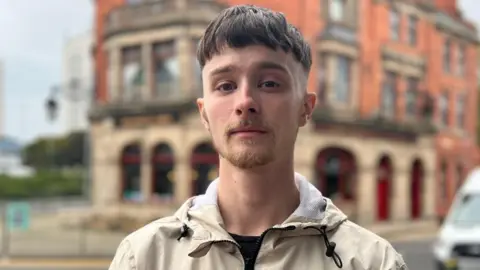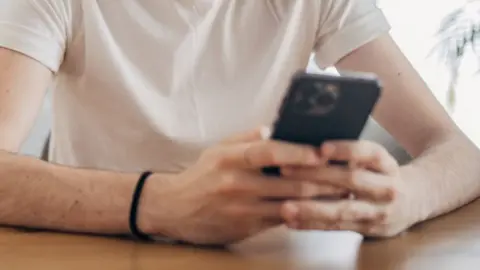Knife crime: 'I've stabbed someone - now I try to stop others'
 BBC
BBCWilliam Greenhalgh knows how it feels to stab and slash a rival.
He carried a blade until he was 16, and now the 21-year-old's working to educate people about the risks and steer others away from violence.
William says he's never killed or seriously injured someone - and he never intended to carry a knife.
He was born and raised in Birmingham in the West Midlands which has the highest rate of knife crime in England and Wales, according to ONS figures.
He grew up with eight brothers and sisters in Alum Rock, considered one of the most deprived areas in Birmingham, and when his dad died he felt he had to do what he could to support his family.
"From a young age I got involved in crime," he tells BBC Newsbeat and Radio 4's Today programme. "It started off with just little petty things and little bits of drug-dealing, and then it slowly escalated."
Before long he was part of a gang and ended up being stabbed in a fight.
It was a turning point.
William got pulled deeper into crime as he was warned about being caught "lacking", or not carrying a weapon.
"So I started carrying and obviously using knives as kind of a protection mechanism," he says. "It's quite a common story amongst younger people."
'It traumatises you'
Statistics show there was a 5% increase in knife crime across the country last year, even though it's not back to pre-pandemic levels.
Police forces in England and Wales recorded about 45,000 offences involving a knife or sharp instrument - including more than 260 killings.
After 15-year-old Elianne Andam was stabbed to death near a bus stop in Croydon on Wednesday, Prime Minister Rishi Sunak added his voice to calls for tougher laws against knife crime.
William was never convicted or jailed for carrying a knife but decided to stop when he became a father in his late teens.
He now works to deter others and part of that is sharing his story and the reality of what it's like to attack someone.
When you use a knife, "it kind of does traumatise you," he says.
"You don't stand around to see the aftermath.
"When you're getting away, you're thinking about what's actually happened to that person, did I kill them? Or did I really hurt them?"
 Getty Images
Getty ImagesWilliam works with groups like Birmingham Says No - an anti-knife crime group - to better educate people on the risks.
"Because I'm young myself, I can speak their lingo," he says. "Once I'm in, I'm in - now I can start planting the seeds."
Once you start carrying, it's hard to reform, says William, and that's why he thinks prevention is vital to reducing violence.
He aims to divert people from picking up a knife in the first place by encouraging them to focus on pursuing their passions, such as music.
"There's a lot of social influence now and it's more cool to carry a knife," says William.
He thinks for young people, there's "a lot more peer pressure around them now to be involved in that sort of activity and behaviour".
However, there is a positive aspect to social media, he adds, as if he sees a post glamorising knives and violence, he can drop the user a DM calling them out before it's too late.
"I know, in my case, I've never killed anyone, luckily. I've never actually hospitalised anyone," William says.
Not everyone he associated with can say the same - and William says he knows people who have been jailed for murder.
"And that's because of the knife and the same situations I was in."
If you've been affected by the issues raised in this article, help and support is available via BBC Action Line.


